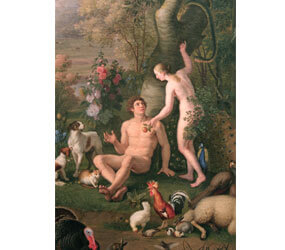G
gama232
Guest
Thank you buffalo for providing that.
No. I have read it as a whole. That is why I posted the OP.And you ignore the parts in conflict. I can’t accept that.
All of them. The whole point was that it has been open to interpretation from the beginning.Ok- which one to focus on.
Catholics are at liberty to believe that creation took a few days or a much longer period, according to how they see the evidence, and subject to any future judgment of the Church (Pius XII’s 1950 encyclical Humani Generis 36–37). They need not be hostile to modern cosmology. The Catechism of the Catholic Church states, “[M]any scientific studies . . . have splendidly enriched our knowledge of the age and dimensions of the cosmos, the development of life forms, and the appearance of man. These studies invite us to even greater admiration for the greatness of the Creator” (CCC 283). Still, science has its limits (CCC 284, 2293–4).
Is it reasonable to conclude that Pius intended that Catholics believe a thing in spite of biological and natural realities? No. What is meant by polygenism should be understood in light of the errors with which Pius was concerned.Catholics cannot accept polygenism - more than two first parents.
This is a non sequitur from @Freddy 's comment. It also does not follow from this conversation. No one here has argued that evolution only includes going from less complex to more complex at all times. This is a common misconception.Most interesting. (from a lieing creationist source - not) Started out with more complexity? Oh my.
Not vague at all. It is reality that you are alive - correct? That is a reality that is a part of the natural world.“Natural realities”? Very, extremely vague. Or maybe you should contact the Pope to straighten him out.
With this sentence, the article from crisis shows it is based on 19th century rationalism rather than 20th, or even 21st century philosophy. Pope John Paul II described the difference in his audience on 19 September 1979, very early in his pontificate:By calling the Genesis story a “myth,” people avoid saying it is mere “fantasy,” that is, with no foundation in reality at all.
Crisis
St John Paul put these observations in a footnote to comments on Genesis 2-3, making them particularly pertinent here. These descriptions describe non-literalist ways that Genesis can be understood, and suggest that the literalist interpretation was not the meaning the author(s) intended. I think these understandings, and the others he adds, are a better description of how the story of Adam an Eve has traditionally been understood than the literalist historicizing interpretation.If in the language of the rationalism of the 19th century, the term “myth” indicated what was not contained in reality, the product of the imagination (Wundt), or what is irrational (Levy-Bruhl), the 20th century has modified the concept of myth.
L. Walk sees in myth natural philosophy, primitive and religious. R. Otto considers it as the instrument of religious knowledge. For C. G. Jung, however, myth is the manifestation of the archetypes and the expression of the “collective unconsciousness,” the symbol of the interior processes.
M. Eliade discovers in myth the structure of the reality that is inaccessible to rational and empirical investigation. Myth transforms the event into a category, and makes us capable of perceiving the transcendental reality. It is not merely a symbol of the interior processes (as Jung states), but it is an autonomous and creative act of the human spirit by means of which revelation is realized.
A Catholic is not required to believe this literally happened.Eve did not evolve, she was made by God from Adam’s side.

Strawman. Clever strawman, but strawman nevertheless.So he guided us into error? I don’t think so.
“Immediate”? Are you sure you don’t want to qualify that? The creation accounts say that Adam was created from pre-existing materials.The authors intended, and the hearers understood, the immediate creation of Adam and Eve.
Note that it isn’t complete infused knowledge of all things, though.The one about infused knowledge?
You seem to have a very ahistorical view of what it means to be Catholic. If you know anything about the history of the Catholic Church, you know that it is dynamic, not static. Doctrines like the Trinity did not exist until they were formulated between the composition of the gospels and the Council of Nicaea. It was process that took nearly 300 years.A very wrong opinion. “Op-Ed Contributor Christoph Schönborn, the Roman Catholic cardinal archbishop of Vienna, was the lead editor of the official 1992 Catechism of the Catholic Church.” I’ll stick with the Catechism which affirms the existence of our first parents.
How so?Hair splitting.
Not claiming they didn’t.Adam and Eve had what are called ‘preternatural gifts’ by the Church. That included bodily immortality. No getting away from that.
